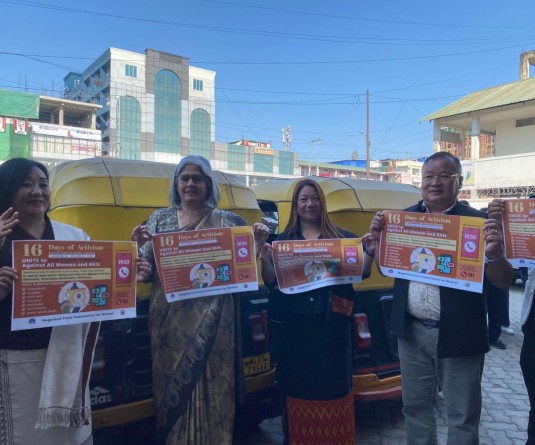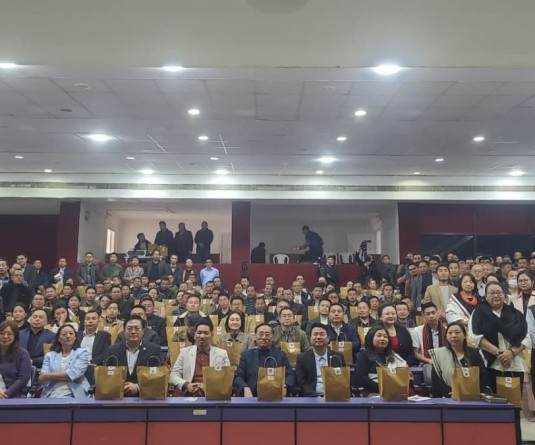
Kohima, July 27 (MExN): The Department of Sericulture imparted 6-day training in Eri silk spinning on motorised spinning machines and 3-day training in Eri silk dyeing and flower making from July 18 to 27 at Gorkha Panchayat Hall, Chandmari, Kohima. The training held under state capacity building was organised by District Sericulture Office, Kohima.
This was the second time the department organised such training in Eri silk spinning, in which the 20 trainees were given spinning machines for free. The first training was held in the month of June.
The main objective of the trainings, according to a press release from Mhianizoto Meyase, District Sericulture Officer (DSO), Kohima, is to empower the sericulturists of Nagaland in various sericulture activities, mainly in the post cocoon sector such as spinning, weaving, silk dyeing, cocoon flower making, etc. so as to uplift their socio-economic status as well as showcase their skills to the outside world.
Silk comprises of four types – Mulberry, Muga, Tasar, Eri, the release informed, adding Eri silk is unreelable and inferior compared to the other types of silk which are costlier and reelable. As such, Eri silk is reeled from three types of spinning machines, namely Takli; Ambar Charkha; Motorised Spinning Machines improvised by CST&RI (Central Sericultural Technologial &Research Institute), CSB. The Motorised Spinning Machine is power and pedal operated and more advanced than the other two. It is light-weight, portable and has higher production capacity of 200 gram silk yarn/day, it stated.
Asangla Alinger, Deputy Director of Sericulture, who was the chief guest at the valedictory programme of the Eri silk spinning training on July 23, informed that Eri silk is popular these days and has high demand both in the domestic as well as international markets due to its soft, lustrous, comfortable and eco-friendly properties. “Knowing these, the department is giving emphasis in its production and the yarn is being sold at a floor price of Rs.2200/kg at present.”
The farmers, she said, can fetch an extra income of Rs.1700 while they get only Rs.500/kg from selling Grade ‘A’ cocoons. Thus, the spinners can produce the yarns in their own homes thereby boosting the state’s economy, she added.
In the second training in Eri silk dyeing and cocoon flower making held from July 25 to 27, the two resource persons, Melino Neikha, Extension Officer and Keneingunuo showed how the trainees can make use of cheap available resources to alleviate their income by dyeing of Eri yarns and fabrics and also make beautiful cocoon flowers from the cut Eri, Mulberry and Muga cocoons.
On the concluding day of the training, Vikehelie Pienyu, Sericulture Officer, Kohima as the chief guest spoke on the importance of post cocoon activities and how the department is trying its best to encourage the interested entrepreneurs to come up at par with the other states in terms of their quality and production.
The release stated that with the implementation of schemes by the State Sericulture department, various training programmes based on season activities of both pre-cocoon and post cocoon components are being imparted to the stakeholders at district levels. Emphasis is also given for urban based women to take up training on spinning of cocoon to yarn, weaving, dyeing, and making decorative items to promote self employment.






